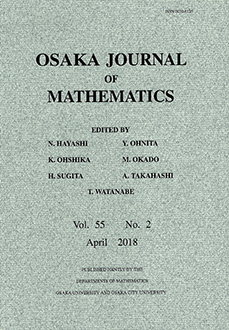Abstract
The first step in the fundamental Clifford theoretic approach to general block theory of finite groups reduces to: $H$ is a subgroup of the finite group $G$ and $e$ is a central idempotent of $H$ such that $e({}^{g}e)=0$ for all $g \in G-H$. Then $\Tr_{H}^{G}(e)$ is a central idempotent of $G$ and induction from $H$ to $G$, $\Ind_{H}^{G}$, is part of a Morita equivalence between the categories of $e$-modules and of $\Tr_{H}^{G}(e)$-modules. Let $W$ be an indecomposable $e$-module, so that $V=\Ind_{H}^{G}(W)$ is an indecomposable $\Tr_{H}^{G}(e)$-module. We present results that relate the Green correspondents of $W$ and $V$ via induction and restriction.
Citation
Morton E. Harris. "The Green correspondence and ordinary induction of blocks in finite group modular representation theory." Osaka J. Math. 46 (2) 557 - 562, June 2009.
Information





